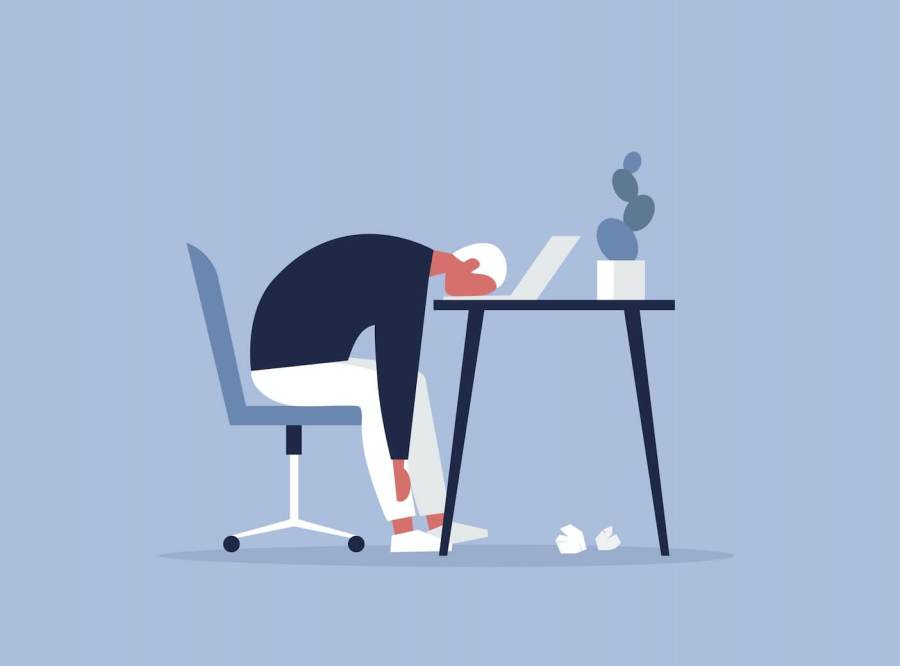Psychological consultant and human performance expert Chris Shambrook reveals some energy-boosting strategies to beat lockdown-related tiredness.

Photography: Getty Images
No-one could have predicted the drastic change COVID-19 was going to bring to all of our lives. We were on track, focused, balanced and looking forward to future events. Then lockdown happened. We had no preparation of such circumstances and absolutely no experience or knowledge of how to live in these circumstances.
So, what happens when we don’t have a ‘plan b’ prepared?
Our certainty goes. Our focus dissipates. The future events we usually take for granted get put on hold indefinitely. Our normal daily patterns and relationships get disrupted.
We’re having to live and work in different ways with little confidence that we’re being effective, productive and working to the best of our abilities. Our home lives and work lives have merged into one, we feel less motivated and our energy wanes.
This new way of living, and new way of coping, has inevitably caused a new level of stress. In layman’s terms, we experience stress when our perceived ability to cope is exceeded by the perceived requirements of the situation we’re in. So it seems reasonable to conclude that we’re all experiencing a level of stress that we aren’t used to, which is in turn causing ‘lockdown fatigue’.
This brain fog, or grogginess, includes a number of symptoms: lack of memory, decreased motivation, inability to concentrate, poor judgment, concentrating on the negative, anxious or racing thoughts, constant or frequent worrying, general unhappiness or depression, moodiness, irritability, anger, loneliness and isolation.
Feeling any of these symptoms? It’s no surprise if you are. Cut yourself some slack and accept you are not the only one. We are all facing an ongoing situation where the requirements are novel and we have no clear plan for the future.
How To Beat Lockdown Fatigue

Ask yourself, “How can I create a positive shift in my energy?”
1. Acknowledge and Accept Fatigue
In order to cope with the symptoms associated with lockdown fatigue, we often try to ignore or suppress the feelings of de-motivation, tiredness, anxiety, sadness etc.
To shift our mindset and mental energy, we must acknowledge and accept what we are feeling, to direct the feelings in productive, positive or adaptive ways. Not only does this provide relief, but it also reduces the power that these feelings have over you.
It’s also useful to ask yourself, “How well can I create a positive shift in my energy?” and to have an open mind to finding out what activities might help elevate your energy levels.
It could be a walk, a short run, a chat with a family member or a phone call to a friend. Find out what works for you.
2. Build Randomness Into your Routine
The ‘lucky dip’ approach can work well for you right now. Instead of following strict routines day in day out, allow the chance for random play and spontaneity.
For example, write down all of your planned exercise sessions for the week on bits of paper, put them in a hat and pick out your ‘exercise lucky dip’ for the week. Or get two dice, re-label one with different exercises and the other with different durations or distances. Roll the dice and see what you end up with.
Introducing random variety in this way will help with what feels like a very monotonous routine right now.
3. Practise Gratitude
Gratitude is hugely beneficial in a number of ways and will come in handy right now more than ever. Try this specific gratitude exercise to help re-wire your mindset:
Every day, focus on something you have achieved during lockdown so far, which you wouldn’t have had the time to do otherwise – be grateful for the time, and the capacity you’ve been given to achieve that one particular thing.
It may be a breathwork session in the morning, a short yoga class before work, or a course you’ve always wanted to start but never had the chance to before, or it could be as simple as – but arguably one of the most important things to be grateful for – spending more time with your family.
Then, write down something you’ll be really grateful to do again post-lockdown and note down why you’ll be grateful for it. Practising and feeling gratitude will help to re-wire your mindset and flood you with a new sense of mental energy.
4. Difference and Sameness
It’s important to stay balanced and aligned, so it’s well worth practising the following exercise to help combat stress and fatigue:
First, write down what’s changed since lockdown started and the areas where you are now more confident, less worried and finding things easier than the first couple of weeks. Next, write down what hasn’t changed in lockdown that you are still able to enjoy. Finally, write what you’re still finding unhelpful and challenging, and commit to asking someone else for their views on how they’re managing it.
This approach can really help to focus you on making progress, rather than feeling like we’re just waiting this out.
5. Keep Communicating
Mental health experts always point to the value of communicating and sharing, so whether you want to record a lockdown video diary, or actually share with a friend, get into the habit of regularly sharing how you’re feeling and thinking with each other.
Just check in regularly and offload. Some days you’ll be sharing that you’re doing well, and other days not so well.
Get used to talking about changes in any direction and be open to listening to others. We are all in this together.
Chris Shambrook is a psychological consultant, human performance expert, and director of PlanetK2










